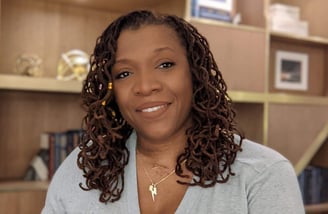Chief Program and Policy Officer: Regina Blye
Join Our Movement
What started as an idea has become a national movement. With your support, we can influence policy and inspire lasting change.
Become an Advocate
Blye sustained a C6-C7 spinal cord injury in 1988 when she was shot through the neck at an end-of-school-year slumber party. She was airlifted from her small hometown of Brownfield, Texas, to a larger hospital in Lubbock, but the severity of the injury was too much for the 10-year-old to absorb.
“I thought I was going to recover and go to a basketball tournament in a couple of weeks,” she says. When a doctor overheard her asking a nurse why she could only move her head from side to side, he casually told her she was paralyzed and would no longer “be able to do anything.”
“That turned my life upside down,” she says.
Despite the grim prognosis, Blye regained movement in her arms and returned home, where her mother became her caregiver. The Americans with Disabilities Act had not yet become law, and there was no internet or National Paralysis Resource Center to provide a way forward; the challenges were many.
“My mom didn’t know where or how to look for resources or services,” Blye says. “It was truly a family on a rural island trying to figure out how to get things for this little girl to help her live her best life.”
Blye learned to speak up for herself, beginning when school administrators suggested home schooling because it would be “too hard” to move classes from the building’s second floor to accommodate her. She objected, and the school made the changes.
“Lo and behold, I didn’t know I was being an advocate for myself at that young age, but I was,” she says.
A pep talk from her stepfather helped guide her when she returned to class.
“He said, ‘Kiddo, you’re not going to be walking around, so you have to use your brains to be your arms and your legs,’” she says. “’ You’ve got to use your smarts.’ That really helped me.”
Blye dove into honors classes and excelled. But even with support from family and friends, people could be cruel. In high school, one classmate told her she would never amount to anything as a black woman with a spinal cord injury.
“Those three things, my visual existence, was what he said would prevent me from being successful,” she says. “Eventually, I used that to motivate myself to say that’s what is going to make me stand out and be different from everyone else.”
At West Texas A&M University, Blye connected with other students with disabilities and began to embrace opportunities to be center stage, whether singing in the choir or debating. After graduating with a degree in communications, she landed a job as a morning news producer in Amarillo and became a D.J. at a local radio station, where she was known as “The Hostess with the Mostess.”
“It allowed me to use my voice to elevate the person that I was and also give people the opportunity to see someone with a disability doing things they didn’t expect,” she says. “Everyone was always so surprised to know the woman they listened to on the radio used a wheelchair.”
Blye’s pivot toward the independent living movement began when she competed in Ms. Wheelchair Texas in 2002. She captured the crown and spent the next year advocating for accessible and affordable housing around the state. Not long after, she joined Life/Run Center for Independent Living in Lubbock as a relocation and transition specialist.
“Helping make sure people got what they needed was the most rewarding piece for me,” she says.
Working with Reeve, she says, is the chance to return to that kind of individualized impact and provide the critical services and resources that help people build healthy, independent lives.
“Without knowing what is out there, people can get stuck,” she says. “And it will dim their light. Sometimes having the right person walk in your space at the right time can make a difference. I think that’s what the Foundation does, and I want to be part of that.”
